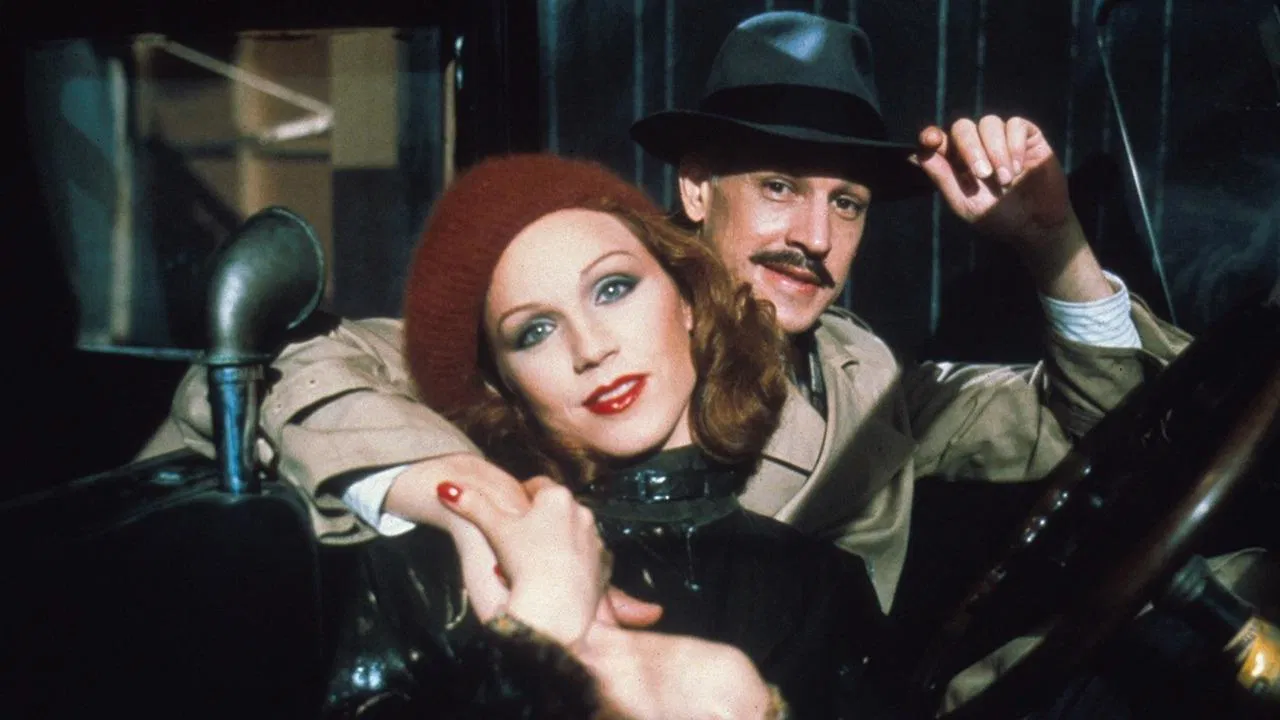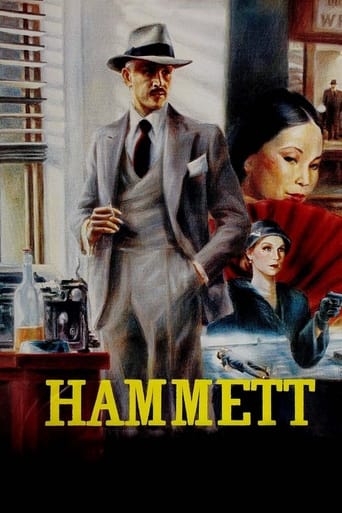

Amateur movie with Big budget
... View MoreEach character in this movie — down to the smallest one — is an individual rather than a type, prone to spontaneous changes of mood and sometimes amusing outbursts of pettiness or ill humor.
... View MoreExcellent characters with emotional depth. My wife, daughter and granddaughter all enjoyed it...and me, too! Very good movie! You won't be disappointed.
... View MoreVery good movie overall, highly recommended. Most of the negative reviews don't have any merit and are all pollitically based. Give this movie a chance at least, and it might give you a different perspective.
... View MoreSort of an alcoholic stupor/dream of a PI flick, enforced by the storybook poetic/magic realism quality of the Zoetrope Studio sets and a melancholy soundtrack. The story revolves around Dashiell "Sam" Hammett post his Pinkerton years, late 1920s, during his Pulp Fiction/Black Mask, penny a word, hack writer days, and the tale of one last case or is it just another hard boiled tale?Wim Wenders and Zoetrope Studios managed to recreate a late 1920s San Francisco crammed with amazing details and populated by what seems like hundreds of extras. Our story begins with a slow zoom into a cheap walk up apartment. Sam Hammett (Fredrick Forest) a chain smoker, a lunger, and a heavy boozer prematurely gray, is pecking out the finale to a pulp story on what looks like an Underhill. While Sam is typing we see the tale as it unfolds. A voice-over narrates in true Hard Boiled Noir fashion. It's a fog bound waterfront of docks and warehouses. A operative named Sue Alabama, has just double crossed her partner Jimmy Ryan. Ryan dopes it out, gets the drop on Sue and recovers the pearl necklace. Sue asks Ryan to give her an hour for old times sake, he agrees, she takes off, but in his narration Ryan tells us he only gave her fifteen minutes and she was picked up at the station. His last line of narration is "Back in '26 Sue Alabama and I nearly got married. I suppose it's just as well we didn't.Sam types The End rolls out his last page and adds it to the stack of the manuscript. He smiles grabs up the pages and stumbles over to his bed where he passes out. Alcoholic stupor/lucid dream? We fade to black then cut to Sam hacking and coughing his lungs up into the sink in his bathroom, until he collapses on the tile floorWaking up in the middle of the night Sam lights up a tar bar and sees a figure sitting in his easy chair. It turns out to be Jimmy Ryan (Boyle) his partner from his Pinkerton days, and he reading his Continental Op manuscript. Ryan says "Sam I don't know whether to be flattered or embarrassed, .. How come the guy doesn't have a name?.... this guy does all the stuff I used to do" Ryan tells Sam that he's in San Francisco working an MP (a Missing Person Case) and that he needs Sam's help. Sam protests that he's done with all that. But Ryan tells the story about a young kid green on the job who would have got a bullet in the eye if Ryan hadn't stepped in the line of fire taking it in the shoulder. The kid tells Ryan that he owes him "saying any time any place " Well Ryan tell's Sam "the place is here, the time is now!" The rest of the tale involves the extortion plot and the various individuals connected, the film is a Noir lover's visual wet dream with a wonderful back-lots and set designed by Dean TavoularisFrederic Forrest is excellent as Hammett, perfect and totally believable in the role of a hard drinking, chain smoking, lunger, ex detective. Marilu Henner is good as Kit. Crystal Ling is great as the story's femme fatale. David Patrick Kelly is good as the gunsel. The rest of the cast perform well the films only faults are one, Peter Boyle, I feel that he is only adequate as Jimmy Ryan, the original casting choice was supposed to be Brian Kieth, who would have brought a ton of cinematic memory with him to the role, Boyle brings the wrong kind of baggage, he's played in too many comedies, he's almost but not quite spoofing the part, too bad. The films second fault, is with the numerous production problems. An 8/10 after repeated viewings
... View MoreThe novel writer Dashiell Hammett is involved in the investigation of the mysterious disappearance of a beautiful Chinese cabaret actress in San Francisco.Who would have thought that Wim Wenders had in him one of the all-time great American detective films? Not me, that's for sure. And yet, here it is with some great characters and plenty of those intriguing twists and turns we love. And Peter Boyle! The setting of San Francisco as opposed to New York or Los Angeles (or Chicago) was a good choice, and of course allows for the Chinatown subplot. Surprisingly, this does not seem to be a common plot element in detective films (besides, of course, "Chinatown").
... View MoreHammett is a fictional story about the great writer Dashiell Hammett (played by Frederic Forrest). The story finds the writer retired from the Pinkerton Detectice Agency and nursing bad lungs and a taste for the liquor. When old colleague Jimmy Ryan (Peter Boyle) comes a calling, Hammett finds himself down in Frisco's Chinatown district in it up to his neck in muck and grime. The back story to the production of Hammett is long and disappointing, all of which makes for fascinating reading and available at the click of a mouse. The film we have to view now may not be the one originally envisaged by director Wim Wenders, but on repeat viewings it shows itself to be a very loving homage to the halcyon days of film noir, a film of great technical craft and guile. Though not without issues either... Production value is high, the set design that brings late 1920s Frisco to life is a joy, as is Joseph Biroc's luscious colour photography. John Barry provides a musical score that smoothly floats around the Gin Joints and Alleyways, while costuming is on the money. Cast are led superbly by the under valued Forrest, with Marilu Henner (Biroc lights her so well), Boyle and Lydia Lei striking the requisite film noir chords, while a host of cameos and short order roles will have the keen of eye putting names to the faces from similar films of yesteryear. The story is complex, which is purposely complimented by narration, canted angles, slatted shadows, billowing smoke, and of course a number of venues that all anti-heroic detectives must traverse to unravel the mystery bubbling away under the seamy surface. The problems are evident of course, it's a very uneven picture, the re-writes etc leaving a disappointing mark. It's also like watching a performance at the theatre, akin to watching a play, the predominantly stage bound shoot - and the almost forced delivery of lines - makes it synthetic. But ultimately there's a lot of noir love here, enough to ensure that repeat viewings for those of that persuasion should find themselves rewarded for their time. 7/10
... View MoreHAMMETT was one of the first books I read for pleasure back in college and I recall anxiously awaiting how it was going to be Zeotroped on screen... visually the movie reminded me of a large single set production (like 1937's DEAD END)... it's almost as if somebody like Bill Gates took a film class and decided to adapt the book as his final. Large plot chunks are missing from the book (notably a car chase and a baseball bat murder) but this movie was so unique (in those pre-Joel and Ethan Cohen days) that I remember it looking like a strange painting even after 20+ years. Forrest is a terrific under-rated actor and was a perfect choice for Dash. You won't be wasting your time checking HAMMETT out but the book has it beat. 8/10.
... View More